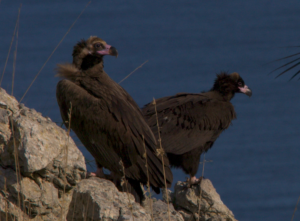Conservation Success Story
The black vulture, also known as Aegypius monachus, is a large bird of prey that is found primarily in Europe and Asia. In recent years, the population of black vultures in Mallorca, has seen a remarkable increase, thanks to the tireless efforts of conservationists and recovery measures.
Four decades ago, the black vulture population in Mallorca consisted of just 19 individuals and a single breeding pair. Today, the population has grown to more than 300 birds, with 45 breeding pairs on the island. This significant increase in population is largely thanks to the efforts of the Fundació Voltor, also known as the Black Vulture Conservation Foundation (BVCF), which was established in April 1987 with the goal of reversing the decline in black vulture populations in Spain and other parts of Europe.
The BVCF was set up by a group of vulture experts from all over Europe, including Iberian wildlife specialist Jesús Garzón, who drew attention to the population decline in the early 1980s when there were only 200 pairs of black vultures remaining in Spain. The foundation worked closely with the Balearic Ministry of Agriculture and Fisheries to implement conservation and recovery measures for the black vulture in Mallorca.
These measures included protecting the vultures from harm, fighting against the use of poison in the natural environment, conserving the Serra de Tramuntana, introducing land stewardship as a management tool, and promoting environmental education and citizen participation through volunteering. In 2002, the trustees of the BVCF also created the Fundación Vida Silvestre Mediterránea (FVSM) as a representative in Spain, extending its social objective to the conservation of all native fauna and flora.
The success of these conservation and recovery measures has resulted in the black vulture population in Mallorca increasing from 19 individuals in 1983 to more than 300 today. The population has tripled in the last decade, and this is a testament to the dedication and hard work of the Fundació Voltor and its partners in saving this vulnerable species from extinction.
However, the work is not done yet. The black vulture is still considered a vulnerable species and the conservation efforts must continue to ensure that the population continues to grow and thrive. The Balearic Government, through the Pla Terrasse for the recovery, conservation and monitoring of diurnal birds of prey in the Balearic Islands, is planning a census of black vultures every ten years, with the aim of monitoring the population and ensuring that the necessary actions are taken to maintain the progress made so far.
In conclusion, the black vulture is a conservation success story that serves as a reminder of the positive impact that conservation efforts can have on endangered species. The dedication and hard work of the Fundació Voltor, the Balearic Ministry of Agriculture and Fisheries, and the countless volunteers have resulted in a remarkable increase in the black vulture population in Mallorca. The future looks bright for the black vulture and with continued conservation efforts, we can ensure that this bird of prey remains a part of our natural heritage.


